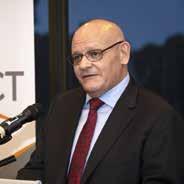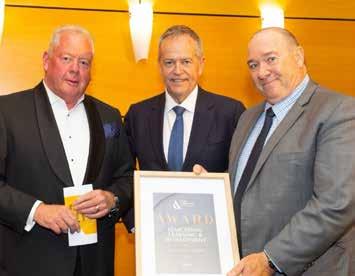














On 12 September, at the National Gallery, Canberra welcomed a new chapter in its cultural landscape with the launch of the Indian Club. It was an evening that blended policy, celebration, and community purpose, underscored by a shared conviction: Canberra is evolving, and our club industry must evolve with it.

The evening opened with thoughtful addresses from key leaders — ACT Government Minister Marisa Paterson MLA, Greens Leader Shane Rattenbury MLA, Liberal Representative Peter Cain MLA — and myself representing ClubsACT. A vibrant cultural dance performance followed, marking not only the launch of a club but the beginning of a lasting collaboration between Canberra’s diverse communities and the broader civic life of the ACT.
From the podium and from the floor, the message was clear: expanding cultural clubs to recognise and embrace Canberra’s changing ethnic and cultural mix is not simply a matter of representation; it is a practical pathway to stronger social cohesion, economic vitality, and inclusive community well-being.
ClubsACT is the peak body for the ACT’s not-for-profit community clubs. Its 43 member organisations operate 49 venues and collectively serve more than 505,000 members. Across sport, culture, and social life, clubs fund, host, and deliver community sport and recreation; provide inclusive, safe venues; and reinvest operating surpluses back into people, programs, and facilities. This is the infrastructure of shared life — and it is precisely the infrastructure that can help Canberra’s cultural communities flourish.
• The Indian community in the ACT is among the fastest-growing: census data show a rise from roughly 12,000 people identifying as Indian in 2016 to around 22,000–24,000 in 2021, now about 5% of the ACT population.
• Growth brings responsibility and opportunity: a community-licensed club would provide a dedicated space for cultural events, family gatherings, support for new arrivals, and broader community giving back.
• A licensed club is more than a venue; it is a social infrastructure: it creates a trusted, permanent hub for festivals like Diwali and Holi, language and music classes, youth mentoring, seniors’ meetups, and mental health and settlement support — enabling activities to run regularly and at scale.
• Bridges, not barriers: a club invites the broader Canberra community to engage with Indian culture in a welcoming setting, fostering everyday contact that reduces prejudice and strengthens social cohesion through events, dinners, film nights, fundraisers, and partnerships with schools and charities.
• Economic and safety benefits: a well-run club supports local jobs and the nighttime economy while operating under clear licensing and harmminimisation standards, offering a safe space for celebrations that might otherwise spill into informal settings.
• A catalyst for collective impact: with a home base, volunteering becomes easier to coordinate, amplifying efforts such as blood drives, disaster relief fundraisers, homework clubs, and skills workshops for both new migrants and long-term residents.
The broader value: why expanding cultural clubs matters in the ACT
1. Recognition of a dynamic, diverse community
• Canberra’s population is changing rapidly. The Indian community’s growth is one example of a broader pattern: Canberra’s cultural mosaic now includes a wide range of ethnic and cultural groups contributing to the city’s vitality.
• Expanding cultural clubs signals to residents that diverse traditions are valued and supported as part of Canberra’s shared identity.
2. Strengthening social cohesion and belonging
• Community clubs provide safe, welcoming spaces where people can come together across generations and backgrounds.
• Regular, accessible venues for cultural events, language classes, and youth programs help families settle, connect with peers, and contribute to Canberra’s social fabric.
3. Economic and civic benefits
• By supporting local vendors, artists, instructors, and event staff, cultural clubs contribute to local economies and the nighttime economy in responsible, well-managed environments.
• Community clubs can partner with schools, universities, and charities, creating opportunities for intercultural exchange, education, and volunteerism.
4. A practical, scalable model for inclusion
• A licensed Indian club is not just a symbolic gesture; it is a concrete, scalable model for sustained cultural participation, leadership development, and mutual aid.
• The success model applies to multiple communities: once a framework is in place for one cultural group, it can inspire and support others, reflecting ACT’s evolving demographic profile.
A shared future for Canberra’s clubs and communities
The launch of the Indian Club is a milestone that embodies a broader national and local shift: cultural institutions must grow in step with the communities they serve.
ClubsACT’s advocacy, paired with government leadership and community initiative, can turn Canberra’s growing diversity into a lasting competitive advantage — enriching cultural life, expanding social networks, and strengthening the city’s civic life for everyone.
• Policy and licensing frameworks should continue to support community-led clubs that are open, safe, and well-governed, with clear expectations around licensing, harm minimisation, and responsible service.
• Funding and support mechanisms should recognise cultural clubs as essential civic infrastructure — not just as cultural venues, but as hubs for social support, education, volunteering, and economic activity.
• Cross-cultural programming should be encouraged, enabling clubs to host intercultural events that bring Canberrans together, reduce prejudice, and build everyday connections.
• Data-informed planning should monitor demographic changes and community needs, ensuring clubs respond to growth in a way that is equitable and inclusive.
If you’re part of a cultural or ethnic community in the ACT, consider how a dedicated club could support your members and the broader Canberra community:
• What services does your community want most — language classes, youth programs, mental health support, or family events?
• How might a licensed club provide safe, reliable spaces for celebrations, education, and volunteering?
• What partnerships with schools, universities, and local charities could amplify your impact?
As Canberra continues to diversify, the opportunity to deepen social connection, economic vitality, and shared civic life lies in the hands of community clubs — supported by organizations like ClubsACT and by leaders across government and political parties. The Indian Club launch on 12 September is more than a celebration of heritage; it is a strategic step toward a more inclusive, cohesive, and resilient ACT.
With the support of Canberra’s communities, we can create welcoming venues that serve delicious food and beverages, host vibrant events, and — most importantly — bring people together. That is good for the multicultural communities, and it is good for the ACT community more broadly.

IGT’s Mega Vault® series unlocks next-level entertainment, teaming two popular and proven mechanics – ‘Hold and Spin’ and ‘Choose Your Volatility’ – for a thrilling gameplay experience.
• O ers unique Hold and Spin gameplay with the option to choose di erent volatilities
• Volatility option available in both Hold and Spin and the Mega Vault Features
• Mega Vault Feature may award up to nine prizes Available on IGT’s PeakDual27™ cabinet as Link and SAP*, Mega Vault® includes four game titles – Emperor’s Guardians®, Vegas Baby! ®, Great Southern Land® and Jin Longzhou™. Are you ready to open a vault of entertainment? Call IGT to find out more on (02) 9812 2300 or visit igt.com.au


Anthony Ratcliffe announced his retirement this year, leaving behind an industry he served for nearly 4 decades, including 10 influential years with Canberra RSL and 27 years at The Eastlake Group. His impact, legacy and influence extend far beyond the Club.
Loyal, humble, honest, supportive, funny, these are all words that are often spoken in the same breath as Anthony Ratcliffe. They demonstrate his leadership style as much as his character as a person.
From 1997 – 2025, Anthony’s leadership has been described the same from many people throughout the years.
Glenn Wallace, the Chief Operating Officer at Canberra Labor Club worked with Anthony back in 1999, “What struck with me immediately was his hands-on style, more than that, his ability to genuinely connect with people. Anthony cared deeply about his staff; he cared just as much about their families.”
Lorin Joyce, President, Eastlake Group, comments “He has always been someone you can rely on – consistent in his values and steadfast in his dedication. Whether it’s in his personal relationships or professional duties, he brings an unwavering sincerity and a generous spirit that uplifts everyone around him”. This has been echoed by many of his peers including Katrina Howden who first worked with Anthony in 2009 as the Functions Manager for The Eastlake Group, describing Anthony as “loyal, trustworthy, humble, understanding, caring and patient.”
Similarly, Craig Goddard, the newly appointed CEO for The Eastlake Group stated “Anthony’s leadership style is hands-on, he leads by example, mentors and

supports his team and empowers people to succeed. He is firm but fair, and always brings a sense of humor into the workplace. The fact that so many employees have been with The Eastlake Group for ten, fifteen, twenty plus years speaks volumes about the positive, supportive culture he has created”.
The work-hard, play-hard attitude Anthony embodies has rung true for decades, which means decades of shenanigans, pranks and lots of laughter.
Just ask Katrina Howden who recalls one of many moments Anthony kept work light. “One day he wanted a bit of a rise out of Caroline (Caz) in the office. So, he called me into his office, slammed the door shut pretending to be cranky, and then said, ‘let’s just sit here and chat for ten minutes or so’. He said to me ‘when you go back out, don’t say a word, just sit at your desk’. Sure enough, I went back out and said nothing. Ten minutes later Anthony walked out and looked at Caz who lost her cool and said, ‘what did you say to her!!’. Ratty and I burst out laughing – ‘Gotcha!”.
Anthony’s repertoire of pranks include, but not limited to; waiting behind doors and underneath tables for a jump scare, turning chairs upside down in the evening once every had left, hiding chocolates in jumpers on the back of chairs, and his parting gift to the Marketing Manager, a car boot full of shredded paper that took an hour to clean, and still finding pieces months later.
Glenn Wallace recounts his own clear example of the culture Anthony created, “The staff Christmas parties he organised which were picnic/BBQ style gatherings at places like the Cotter and Telopea Park School. These were never just staff functions; they were true community events where partners and children

were welcomed as part of the Eastlake family. Those gatherings captured Anthony’s belief that the Club was more than workplace, it was a community built on respect, inclusion, and genuine care for people.”
Anthony’s greatest legacy?
“His legacy is one of service, passion and progress”Anthony Craig, Executive Chef, Eastlake Group.
“Anthony’s greatest legacy is the strong, sustainable foundation he has built at Eastlake. One that will support and benefit future generations. He didn’t just manage a Club; he shaped a community institution”Lorin Joyce, President, Eastlake Group
“The strength of community and purpose he built within Eastlake, and in turn, the broader ACT Club Sector” - Kate Palmer, Operations Manager, ClubsACT
“The workplace culture he built, one where people feel valued, supported, and proud to be part of the team. His hard work and dedication shaped the Eastlake Group into what it is today” - Craig Goddard, CEO, Eastlake Group
The consensus of the legacy Anthony leaves behind is, it’s more than a successful Club, it’s the values,
relationships and careers he helped build during his time at Eastlake. From establishing Eastlake as a resilient, forward thinking, and community driven organisation, to mentoring, supporting and inspiring those around him.
Evident in the Annual Reports throughout the years, Anthony has steered Eastlake to success with initiatives including numerous development projects, modernising operations and implementing structures that have ensured Eastlake’s continued success. Well described by Eastlake’s Executive Chef, Anthony Craig, “Anthony’s influence has been felt far and wide. His vision and commitment have not only strengthened the organisations he served but also elevated the standards of the entire industry.” Similarly, Kate Palmer, Operations Manager at ClubsACT has reflected, “Anthony has a gift for mentoring and encouraging people. There were countless occasions where he quietly guided emerging leaders, giving them confidence and space to grow. His generosity with his time and knowledge is remarkable”.

Throughout his time, Anthony Ratcliffe has shared his knowledge, mentored future leaders, advocated for industry-wide improvements, and championed causes that enhanced the reputation and sustainability of Clubs across the region.
In the words of Mark Parton MLA “Ratty, it’s never going to be the same once you are not in this space”






Learn about super in Australia.
Australia has one of the world’s best superannuation systems. Superannuation is built on three principles: everyone should have access to it, contribute regularly to it and keep it for retirement. Super works as a supplement to the Government Age Pension by aiming to provide Australians with additional financial security when they retire.
As of 1 July this year, employers must contribute 12% of employees’ salary to super. Beyond helping individuals, super helps boost Australia’s economy by investing in infrastructure, housing, renewables and businesses.
Our population is aging and Australians are living longer and healthier lives. This means the super system must continue to play a vital part in supporting retirees and while aiming that younger generations aren’t burdened with higher taxes to fund the Age Pension.
AustralianSuper | See how super helps all Australians

From rugged beginnings
comes a refined wine

If you know wine, you know Wynns, the jewel of the Coonawarra – a world-class region in South Australia. Since the first vineyards were planted in 1891, this heavyweight of the Australian winemaking world has gone about its craft quietly. Amassing runs on the board and fame far beyond Australia’s shores, it’s become famous for the flagship John Riddoch Cabernet Sauvignon and Michael Shiraz.
Over time, Wynns has become known for its luxury positioning, and as such Treasury Wine Estates (TWE) has evolved the brand to reflect this. From bottle design out, Wynns has been rebranded and repositioned as a true luxury wine brand. Across social, OOH, point of sale, tasing notes, website and much more, this repositioning has taken a full 360 approach across all touchpoints
It’s a wine that’s tempered by the arctic winds of the Southern Ocean, grown in rich Terra Rossa soil set upon a bedrock of ancient limestone, millions of years in the making. It’s not where you’d expect to find luxury but here, the imperfect and hard-wearing elements create perfection. And this isn’t entirely unique to the world of luxury – the same could be said about diamonds and pearls.
Through this insight and brand truth, came the new brand platform, ‘BRUTALLY, ELEGANT’ created by TWE’s in-house agency, Splash. A platform designed to stir emotion, while repositioning Wynns in the elevated space in which it’s earned the right to play.
“Brutally Elegant is the story of juxtaposition, yin and yang, dark and light. An evocative and visceral theme, one that we look forward to informing brand experiences, tastings, brand ambassadors and more”, says Tom Opie, Creative Director at Splash (Treasury Wine Estate’s in-house creative agency).

The Canberra Institute of Technology (CIT) has officially opened its new Woden Campus.
The state-of-the-art facility is set to become a vital hub for creating a pipeline of skills and knowledge to drive economic growth in the ACT and surrounds.
CIT Chief Executive Officer Dr Margot McNeill said that the opening of the Campus is a transformative milestone for vocational education in the ACT.
“The opening of CIT Woden comes at a pivotal moment for vocational education and training in the ACT and the nation, asserting TAFE’s place at the heart of vocational education and training and signalling a significant shift within the broader tertiary education system to recognise the critical role we place in creating the workforce of tomorrow.”
The campus has been designed to provide a bespoke, modern facility empowering both students and educators. It features smart classrooms with cutting-edge technology and simulated learning environments that offer immersive, hands-on experiences, replicating real-world scenarios.
Dr McNeill said that CIT Woden students will benefit from state-of-the-art commercial kitchens, advanced cybersecurity labs, and other specialised facilities, ensuring graduates are job-ready from day one.
“The smart campus prioritises shared and collaboration spaces to encourage interdisciplinary learning and sharing of ideas between different industry sectors. This will foster holistic learning and cultivates the adaptable, problem-solving skills demanded by today’s employers.
“The CIT Woden campus is more than just a collection of classrooms and workshops; it is a place where careers will be launched, industries will be transformed, and lives will be changed. It is a beacon of opportunity, designed to inspire, educate, and empower generations to come.” Dr McNeill said.
An example is the newly opened CIT Restaurant –where students will learn to operate at a professional level, serving real customers, managing real-world pressures, and creating unforgettable experiences. The CIT Restaurant is a modern and light-filled space, providing an exceptional dining experience for guests.
A key feature of the facility is its open-plan design, which allows diners a unique view into the kitchen. From the cutting-edge commercial kitchens to the simulated dining areas, every part of this new facility is purpose-built to give students the skills and confidence they need to succeed in the hospitality industry.
Guests will be able to watch Certificate II Cookery, Certificate III Commercial Cookery, and Certificate III Patisserie students prepare fresh, affordable breakfast, lunch, and dinner menus using state-of-the-art induction cooktops and appliances.
A large window also separates the dining area from the bakery, allowing guests to watch students at work. Beyond the kitchen, Certificate III Hospitality students will be serving guests, gaining hands on experience in a real-world setting.
Students will have the opportunity to engage with diners, seeking direct feedback on their dishes and service, which is a crucial part of their professional development.
CIT would also like to acknowledge all our project partners, community organisations, local businesses, unions, and government agencies for their invaluable strategic insights and engagement, which ensured the Woden campus was designed to truly serve the needs of the community.
“CIT Woden will stand as testament to CIT’s unwavering commitment to shaping the future workforce of the ACT and the nation,” Dr McNeill said. ‘If you’d like an excuse to explore, come and visit us at the Hair and Beauty Bar, in the CIT Restaurant, or enrol as a student!
https://cit.edu.au/about/ locations/woden

In an evolving regulatory environment, staying informed and ahead of the curve has never been more important. ClubsACT members and staff recently gathered at the Harmonie German Club for the August Micro-Conference, Industry Compliance and Regulation: The Year Ahead and Beyond. The session brought together expert speakers who unpacked the latest developments in industry compliance, governance, and legislative requirements, as well as what’s on the horizon.
Covering topics from emerging obligations to strengthening board accountability and navigating risk, the session equipped attendees with valuable insights and practical tools to lead with confidence and ensure compliance.
The conference featured presentations from Derise Cubin (Commissioner of Fair Trading), Giuseppe Mangeruca (Chief Executive Officer, ACT Gambling and Racing Commission), and Michael Phelan APM (Strategic Officer to Kroll).
Key Highlights:
• Regulation and Licensing: Derise Cubin outlined the Commission’s role in administering the Liquor Act, managing licences and permits, and ensuring compliance, with a strong emphasis on harm minimisation and community safety. She noted that Access Canberra plays a critical role in education and enforcement, including inspections and addressing issues such as expired licences, RSA breaches, occupancy limits, and signage requirements.
• Gambling and Racing Oversight: Giuseppe Mangeruca discussed the ACT Gambling
and Racing Commission’s operations as an independent statutory body. He highlighted its work in regulating gaming laws, collecting taxes, reviewing legislation, and reducing gambling harm. Key priorities include tackling illegal behaviour, engaging with stakeholders, and supporting harm minimisation through compliance programs, exclusion databases, grants, and community initiatives.
• AML and Compliance Risks: Michael Phelan APM addressed common gaps in Anti-Money Laundering programs, such as inadequate risk assessments, insufficient oversight of high-risk customers, and limited board engagement. He highlighted AUSTRAC’s increased focus on outsourcing practices in clubs and stressed the importance of strengthening due diligence, improving governance, and closing compliance gaps.
• This conference provided members with timely and practical insights to help navigate an increasingly complex regulatory environment.


GUEST SPEAKER: MR GIUSEPPE MANGERUCA | CHIEF EXECUTIVE OF THE GAMBLING AND RACING COMMISSION
Mr Giuseppe Mangeruca is the Chief Executive of the Gambling and Racing Commission within Access Canberra. Mr Mangeruca is an experience public servant and brings a diverse range of skills including regulation, law and government administration to the Commission.
Mr Mangeruca has held senior leadership positions across a range of regulatory areas including executive responsibility for Licencing and Registration, Fair Trading and Compliance, and Construction and Planning Regulation. Mr Mangeruca has, among other things, qualifications in law.

GUEST SPEAKER: MS DERISE CUBIN | ACT COMMISSIONER FOR FAIR TRADING
Ms Derise Cubin was appointed as the ACT Commissioner for Fair Trading in January 2021. Derise is also the Executive Branch Manager Licensing and Registrations in Access Canberra, ACT Government and is responsible for a range of regulatory licensing functions including Liquor, Gaming & occupational licensing across a range of industries. Derise also has responsibility for operational Road Transport driver licence and vehicle registration functions in the ACT.
Derise has over 20 years’ experience working in regulatory, enforcement and investigation roles, and has worked across multiple public sector agencies including the New Zealand Commerce Commission, the Australian Competition and Consumer Commission as well as the ACT Government. Derise is the Chair of the ACT Chapter of the National Regulators Community of Practice. Derise hold an Arts Degree majoring in criminology from Victoria University, Wellington, New Zealand.

Michael is Strategic Advisor to Kroll to advise the firm’s Investigations, Diligence and Compliance practice in Australia, adding to the team’s robust expertise in complex investigations challenges related to fraud, corruption and anti-money laundering. Based in Canberra, Michael leverages more than 35 years of experience in law enforcement.
Prior to joining Kroll, Michael served as Chief Executive O cer of the Australian Criminal Intelligence Commission (ACIC) and Director of the Australian Institute of Criminology (AIC), where he oversaw the development and maintenance of national information and intelligence sharing services through key initiatives, including the National Criminal Intelligence System, the National Child O ender System, and the Australian Firearms Information Network. Before that, he held the title of Chief Police O cer of the ACT and Deputy Commissioner for National Security at the Australian Federal Police.
Additionally, Michael was recognized with the National Medal in 2000 and was awarded the Australian Police Medal in 2008. Michael holds a degree in Commerce, an honours degree in Law and a master’s degree in Business Administration from Melbourne Business School.



How might your language shape someone’s experience of gambling harm?
To mark Gambling Harm Action Week (20–26 October), the ACT Gambling and Racing Commission has released a new Guide for Talking About Gambling and Related Harms.
This year’s theme, Let’s change the conversation, encourages us to reflect on how language shapes public understanding of gambling harm. The guide promotes a balanced narrative—recognising that gambling is a risky activity that can harm anyone, and that responsibility for reducing harm is shared across individuals, communities, industry and government.
It also provides guidance on recognising the scope and scale of harms—from financial stress and relationship breakdowns to broader impacts on families and communities.
In the ACT, 1 in 6 people are affected by gambling harm—either their own or someone else’s. The guide offers practical tips for using person-first language, avoiding stereotypes, and including support options in communications.
Whether you’re a community member, service provider or communicator, this guide can help you start better conversations and reduce stigma.
Read the guide and learn more at: www.act.gov.au/community/ gambling-harm/talking-aboutgambling-harm
Let’s change the conversation—because open, thoughtful dialogue is better than silence.

Summer is more than just a season—it’s a chance for venues to unlock growth. Longer days, outdoor dining, live sport and festive celebrations all bring people together, creating moments where the right drinks program can deliver both exceptional experiences and stronger returns. At ILR, we believe independents should never face this alone.
As a Canberra-based company, ILR exists to give clubs, pubs and restaurants the collective strength to compete, grow and thrive. Today, our network spans 500+ outlets across metro and regional areas, making us one of the largest independent liquor networks in Australia.
By becoming a member, venues gain access to:
• Collective buying power that secures exclusive pricing and stronger supplier partnerships.
• Strategies that drive foot traffic and build customer loyalty.
• Tailored ranging programs designed to protect margins and maximise profitability.
• Technology and insights that make ordering simpler and decisions smarter.
• A network of industry expertise to help navigate challenges and capture new opportunities.
• Royalty-free access to ILR’s established banner group brands, giving members instant market recognition without additional costs.
Every member benefits individually, but together our network creates an edge that independents cannot achieve on their own.
For prospective members, summer is the perfect time to join. It’s a season of opportunity—and with ILR, it becomes a season of results.
Join ILR today and be part of a network built on collaboration and success.
To learn more visit ilr.net.au or contact info@ilr.net.au.


Supporting those affected by gambling harm
Gambling is a popular and prevalent social activity enjoyed by many people in the community and is facilitated throughout different venues and is accessed in many different ways. However, for some families and friends, the impacts of a loved one’s gambling can be deeply distressing and present as a life changing situation whereby they feel they have no control or ability to change the course in relation to the gambling harm they are experiencing, through the actions of another.
If you feel you are in a situation whereby someone you know is gambling and this is having a serious effect on you or others around you, the new Family & Friends Gambling Drop-In Group run by Relationships Australia Canberra & Regions (RACR) (counsellors and lived experience workers) may be the support you need.
These free monthly groups provide a safe, welcoming space to:
• Connect with others who understand what you’re going through
• Share experiences and reduce feelings of isolation
• Learn practical strategies to cope with the effects and impacts of gambling harm
• Access information about further support options that offer confidential and free assistance.
If gambling is affecting you, even if it is through the actions of another, you don’t have to face it alone. The Family & Friends Gambling Drop-In Group is a gentle, stigma-free way to find support and be understood.
Accessible locations in Gungahlin & Tuggeranong
TIME: 12:45pm – 2:00pm
Start dates to be confirmed, launching week of October 20 2025
Free to attend | No registration required | Attend anonymously if preferred
For more information, visit www.racr.org.au or call (02) 6122 7100 for confidential support and to learn more about the drop-in groups or individual counselling options available for people experiencing gambling harm
What the Fair Work Amendment (Protecting Penalty and Overtime Rates) Bill
If you’re steering a licensed club through payroll, rostering, and wage policy, a recent federal reform is set to keep unsocial-hour loading and overtime payments intact.
The Fair Work Amendment (Protecting Penalty and Overtime Rates) Bill 2025, introduced July 24, 2024 and enacted on 28 August 2025, protects penalty and overtime entitlements in modern awards from being reduced or rolled into higher base pay.
For clubs operating under the Licensed Clubs Award, this means penalties for Sundays, late nights, public holidays, and other unsocial hours remain visible, enforceable, and separate from base wages.
What the Bill does (in plain terms)
• Core aim: Prevent the Fair Work Commission (FWC) from reducing penalty and overtime rates in modern awards when awards are made, varied, or revoked.
• Roll-up prohibition: Stops employers from blending penalty/overtime into a single base rate to simplify pay if any employee would be worse off.
• Scope: Applies to the FWC’s powers to make, vary, or revoke awards, including decisions affecting pre-existing awards under the new framework.
• Practical guardrails: Keeps intact Sections 144 (flexibility terms) and 160 (amendments to remove ambiguities or correct errors).
• New principle: Section 135A introduces a protection that the rate of any penalty/ overtime is not reduced, and that penalties are not replaced with lower remuneration forms that reduce extra pay.
• Supplementary protection: Clarifies the new principle won’t trigger unnecessary reviews of all modern awards or outside the scope of relevant applications.
• Commencement: Applies to awards made before commencement, and to decisions made after commencement; the entire Act commenced the day after royal assent.
• Penalties stay separate: Penalties and overtime entitlements must remain as separate loadings and cannot be rolled into higher base pay, even if that would simplify payroll.
• After-commencement decisions: When the FWC makes, varies, or revokes the Licensed Clubs Award post-commencement, penalty/ overtime rates must not be reduced.
• No automatic override of flexibility or drafting-error fixes: The protections do not erase the value of flexibility terms or the ability to fix errors; those tools remain available where appropriate.
• Operational impact: Expect penalties for Sundays, late nights, public holidays, and other unsocial hours to continue as distinct entitlements, preserving staff incentive and fairness.
• Front-of-house and gaming staff (bartenders, wait staff, food service, gaming floor staff, supervisors): Penalties are likely to remain as separate loadings for unsocial hours; blending penalties into base pay is constrained.
• Kitchen and back-of-house staff: Similar protections apply if penalties exist for late shifts or weekend/holiday work; reduced penalties through base-pay roll-ups are unlikely to be viable.
• Casual, part-time, and full-time: The protections apply regardless of employment type; casual loading cannot mask reduced penalties.
• Cost, rostering, and operations: what to watch for
•
• Cost visibility and predictability: Penalty payments must reflect the unsocial-hour loading and cannot be compressed into base wages. Budgeting may show penalties more explicitly, or base rates may be adjusted with other trade-offs while preserving penalty loadings.
• Rostering design: You’ll continue to schedule around high-demand periods, but penalties must be properly applied. Rosters should capture all penalty hours (Sundays, late-night shifts, public holidays) as per the award and any club agreements.
• Payroll systems: Ensure payroll rules keep penalties as separate loadings where they apply; run pay-cycle tests to confirm penalties calculate correctly under the new framework.
• Compliance and audits: Periodic checks against the Licensed Clubs Award are prudent, particularly for venues with strong weekend or after-hours demand.
• Guest experience and workforce morale: Clear penalty structures support fair compensation for unsocial hours, aiding retention and morale.
1. Map penalty exposure
• Identify which hours attract penalties under the Licensed Clubs Award and the exact rates (e.g., Sundays, late-night hours, public holidays).
• Note any differences for gaming vs nongaming staff if applicable.
2. Audit for “roll-up” practices
• Review current rosters and pay structures to identify any blended/base-rate arrangements that could mask penalties.
• Flag and eliminate arrangements that would conflict with the 135A protections.
3. Align payroll and rostering systems
• Ensure payroll rules reflect penalties as separate loadings where they apply.
• Run a test pay cycle to verify penalties calculate correctly under the new framework.
4. 4. Update policies and communications
• Revise wage and rostering policies to state penalties remain in place and cannot be rolled into base rates.
• Communicate clearly with staff about how penalties are calculated and when they apply; ensure transparency during transition.
5. Engage advisers for a venue-specific review
• Have an industrial relations adviser or payroll consultant review award interpretation, rosters, and any enterprise agreements for compliance.
6. Prepare for a transition plan (if changes are anticipated)
• Develop a staged plan for payroll process adjustments, manager training on rostering to penalties, and staff briefings.
7. Scenario planning and ongoing monitoring
• Run scenarios for weekend peaks, events, and public holidays to understand cost impact and staffing needs under the preserved penalty framework.
• Establish a monitoring process to catch incorrect pay calculations early.
• The Bill preserves the integrity of penalty and overtime rates, ensuring penalties are not diminished by rolling them into base pay.
• It does not disrupt flexibility provisions or existing enterprise agreements; however, it does require clubs to maintain clear, separate penalty loadings on pay.
• A robust transition plan—covering policy updates, payroll system alignment, and staff communication—will help clubs maintain compliance, protect staff remuneration, and avoid budgeting surprises during peak periods.
• Start with a penalty exposure map for your venue(s) under the Licensed Clubs Award.
• Audit for any rolled-up pay practices and correct them to preserve 135A protections.
• Invest in payroll system configurations and staff communications to keep penalties transparent and visible.










Building Confidence, Building Canberra
Visit our website www.savilgroup.com.au
Email us at: info@savilgroup.com.au
More information call us : 0421 993 423












In the heart of Australia’s capital, where community clubs serve as vital hubs for social connection, recreation, and local economies, a quiet policy barrier is stifling growth. The ACT Government’s Lease Variation Charge (LVC) – a levy imposed on lease changes or subdivisions – is adding unpredictable costs that deter investment, hamper productivity, and limit housing supply.
As representatives of over 50 clubs managing more than 500 hectares of green space across the territory, ClubsACT is calling for urgent reform. Removing or reforming the LVC isn’t just about easing financial burdens; it’s about unleashing economic potential, creating jobs, and addressing the housing crisis. In this article, we explore why this change is essential and how it can be implemented in a budget-neutral way that benefits everyone.
Imagine planning a much-needed expansion for your club – perhaps adding new facilities to diversify income streams or redeveloping underused land for community benefit – only to be hit with a charge running into hundreds of thousands, or even millions, of dollars. That’s the reality of the Lease Variation Charge. Tied to enhanced commercial property valuations during lease variations or subdivisions, the LVC introduces volatility and unpredictability. Combined with broader rates increases, it can escalate costs dramatically; one local club faced a staggering 930% hike on a community oval and public carpark.

This isn’t an isolated issue. A recent survey reveals that 40% of ACT businesses expect to report a loss this year, amid a challenging trading environment. For clubs and community-based organizations, these charges erode viability, restrict cash flow, and discourage investment in diversification. We’ve heard from members struggling to adapt, with some even considering relocation outside the ACT due to the burdensome rating and charging regime. The broader business community, including the Business Chamber, Property Council, AHA, and ClubsACT, has united in calling for greater transparency, improved appeal mechanisms, and reforms to foster investment and sustainable operations.
At its core, the LVC matters because it stifles the very innovation and growth that clubs bring to the ACT. Our sector maintains vast green spaces, supports thousands of jobs, and provides essential community infrastructure – all at no cost to the government. Yet, these punitive charges risk capital flight, stalled projects, and lost opportunities for job creation.
Removing the LVC could transform the ACT’s economic landscape by addressing key pain points and unlocking productivity gains. Here’s how:
• Cost Certainty and Improved Cash Flow: Eliminating this unpredictable expense allows businesses to plan better, freeing up capital for investments in automation, training, and equipment that enhance efficiency.
• Encouraging Expansion and Investment: Lower upfront costs make it easier for firms – including clubs – to expand premises, hire staff, and adopt productivity-boosting tools, rather than diverting funds to tax fees.
• Enhancing Competitiveness and Retention: A simpler regime would make the ACT more appealing to investors and tenants, reducing relocation risks and fostering a stable, growing economy.
• Better Capital Allocation: Resources currently tied up in LVC payments could be redirected toward technology adoption, process improvements, and skilled labor, driving real productive capacity.
• Supporting SMEs and Entrepreneurship: Smaller operations, like many clubs, are hit hardest by these charges. Reform would empower startups and scale-ups, boosting productivity across sectors.
Industry leaders have proposed practical steps: commissioning an independent review of rates, valuations, and LVC; broadening the revenue base to replace lost income; introducing transitional provisions; and creating clearer appeal pathways. These measures would restore confidence, prevent capital flight, and align policy with business needs.
To make LVC removal a reality, ClubsACT advocates for a staged, transparent approach:
• Phased Removal: Commit to eliminating LVC over time, paired with a review of overall rate policies and valuation methods.
• Transitional Relief: Offer support for small to mid-sized tenants and ongoing projects to safeguard cash flow.
• Guidance and Tools: Publish plain-language explanations and an online calculator for forecasting post-reform impacts.
• Stakeholder Engagement: Host cross-portfolio briefings and public forums to ensure reforms reflect business and community concerns.
By phasing in changes with measurable outcomes –like new jobs, additional floorspace, and technology adoption – the ACT Government can deliver a productivity boost without undue disruption.
Critics might worry about revenue loss, but a welldesigned reform can be budget-neutral, preserving fiscal integrity while removing barriers. The LVC currently bolsters the rate base, but alternatives exist to maintain revenue stability:
• Phase-In Strategies: Gradually phase out LVC over 3–5 years, broadening the rate base through modest adjustments to commercial property rates or land tax to spread the burden evenly.
• Efficiency Gains: Streamline administrative processes, such as faster appeals and simpler calculations, to offset any shortfalls.
• Safeguards: Implement caps on rate volatility, regular independent reviews, and temporary measures like targeted levies on high-value properties, with sunset clauses.
This approach directly tackles housing shortages too. By lowering development costs and reducing unpredictability, LVC removal encourages infill and higher-density projects in urban areas. Developers gain confidence for multi-year programs, lenders offer better financing terms, and more affordable or mixeduse housing becomes viable.
ClubsACT has long called for transparency and credible investment plans – a budget-neutral reform anchored in these principles would deliver, with forecasts showing increased housing units, infill projects, and jobs.
Practical ideas include a staged plan: Remove LVC from new variations in years 1–2 with relief for small tenants, then fully adjust the rate base by years 3–5. Annual reports could track housing impacts, while fast-track appeals and transition funding support community housing programs.
Removing the Lease Variation Charge, paired with transparency, valuation reform, and strong transition
For over 110 years, Paynter Dixon has delivered visionary spaces for clubs and hospitality venues - built with precision, purpose, and partnership.
safeguards, would eliminate a major cost and risk for ACT businesses and clubs. This isn’t just policy tinkering; it’s a pathway to expansion, investment, job creation, and increased housing supply – exactly what our economy needs in tough times.
ClubsACT urges the ACT Government to act on these recommendations, starting with an independent review and collaborative forums. By doing so, we can preserve our community assets, support local businesses, and build a more productive, affordable, and vibrant territory. For more information or to join the conversation, visit clubsact.com.au or contact us directly. Together, let’s unlock the ACT’s full potential.












Craig Shannon, CEO ClubsACT
In a bustling city like Canberra, community sports aren’t just about competition— they’re the heartbeat of social connection, health, and inclusion. Yet, barriers like cost, access, and facility limitations continue to sideline too many potential participants.
ClubsACT, the peak body representing 43 notfor-profit community clubs across 49 venues and over 505,000 members, recently submitted a comprehensive response to the Standing Committee on Economics, Industry and Recreation’s inquiry into barriers and opportunities for participation in community sports in the ACT. Drawing on robust evidence from the 2023 ACT Sport Survey, government policy reviews, and real-world insights from our sector, this submission outlines actionable strategies to play sports more accessible for all Canberrans. Here’s a deep dive into our key findings and recommendations, tailored for our industry peers and partners.
ClubsACT members are more than just venues; they’re community anchors that fund, host, and deliver sports programs while reinvesting surpluses into people, facilities, and inclusive initiatives. Over the past decade, our clubs have poured over $100 million into community infrastructure, with another $50 million in the pipeline. In 2023 alone, we provided at least $273,000 in direct support to sports— including $141,000 dedicated to female activities—plus invaluable in-kind contributions like venue access, equipment, and event logistics.

Our venues serve as safe, regulated spaces for teams, volunteers, officials, and families, combating loneliness and fostering retention. This positions clubs uniquely to drive participation growth, especially when aligned with the ACT Government’s Sport and Recreation Grants Program (SRGP) Review Response from October 2022. This response introduces delivery-focused programs like the Industry Partnership Program (IPP), Community Sport Facilities Program, Club Enhancement Program, and time-limited State Organisation Support (SOS), all geared toward a “participation-first” agenda.
The survey paints a clear picture: 86% of Canberrans engaged in sport or physical activity in the last 12 months, but significant hurdles remain. Cost and inconvenient activity times top the list of barriers, with about one in four respondents saying cost could be a major deterrent. People with disabilities report higher concerns about facility suitability (48% vs. 36% for those without), while women face amplified challenges around cost, location, skill levels, competitiveness, and “roughness.” Satisfaction plummets among financially strained households, though safety is a bright spot—rated highest among factors.
We also draw lessons from sectors like lawn bowls, as highlighted in the Bowls ACT submission and the 2021 ACT Government Strategic Review. Bowls offers inclusive, low-impact participation ideal for people with disabilities or chronic conditions, yet geographic sparsity, poor public transport, outdated perceptions (e.g., “it’s only for older people”), volunteer burnout, and venue closures hinder growth. Recent closures, such as the Southern Cross Bowling Club in 2012 and Weston Creek Bowling Club’s planned cessation in 2026, underscore the need for secure tenure and upgrades to prevent further access inequities.
Our submission zeros in on Terms of Reference 6, emphasizing practical, evidence-based reforms to dismantle barriers. Aligned with the SRGP Review, we recommend leveraging existing programs for maximum impact:
• Tackle Cost Barriers Head-On: Introduce means-tested activity vouchers and transport support, redeemable through clubs and associations, to make sports affordable for low-income families, retirees, and those on fixed incomes.
• Optimize Scheduling and Access: Co-invest in LED lighting for extended “safe hours” and unlock school and community facilities for earlier evening or daytime slots, prioritizing women, families, and seniors.
• Scale Inclusive Programs: Use Club Enhancement grants to roll out beginner/ social formats, come-and-try seasons, inclusive onboarding with buddy systems, and allabilities programs. Prioritize women and people with disabilities to address surveyhighlighted gaps.
• Harness IPP for Transformative Initiatives: Fund “game-changer” projects like district pilots in high-barrier areas, a territory-wide digital discovery and booking platform, and club-school pathways that convert introductory experiences into sustained
participation. These multi-year, co-invested efforts would include robust performance tracking, ensuring scalability without relying on operational funding.
We also call for targeted subsidies, energy-efficient upgrades, and volunteer recruitment/training to combat burnout—a systemic risk across community sports.
For Terms of Reference 7, we advocate a policy framework that ensures facilities are participantcentered, sustainable, and equitable:
• Secure Ownership and Tenure: Standardize long-term community leases for cluboperated facilities, incorporating Community Use Guarantees. These would mandate minimum community hours, priority access for cohorts like juniors, women, and people with disabilities, and adherence to inclusion standards.
• Strategic Funding: Prioritize co-investment via the Community Sport Facilities Program for upgrades that directly boost participation, such as female-friendly amenities, accessible features, lighting, and multi-use courts. Link grants to measurable outcomes to ensure accountability.
• Efficient Operating Arrangements: Implement shared-use templates with transparent pricing, concessions, and priority booking for beginners, juniors, women, and disability groups. A central booking and data platform across public, school, and club sites would streamline access and provide insights into usage. Embed accessibility and gender-equity standards and require inclusion training for any publicly funded operations.
These reforms address the survey’s findings on facility suitability and times, while drawing on lessons from bowls venue closures to promote longterm planning and viability.
To make these recommendations tangible, ClubsACT proposes bold, measurable goals:
• +15% female participation and +30% growth in girls’ teams.
• 200 new inclusive sessions per year focused on disability, seniors, and beginner formats.
• 20% conversion rate from school or come-and-try programs to full club registration.
• 50 venues with lighting upgrades and 100 facilities enhanced with female-friendly and accessibility features.
• +10% volunteer base through club-hosted, inclusive training programs.
These targets are achievable through partnerships, leveraging our clubs’ investment capacity and the government’s SRGP framework.
ClubsACT and our member clubs are primed to collaborate with government, sporting bodies, and the community to turn these ideas into reality. By focusing on evidence from the 2023 ACT Sport Survey and aligning with established policies, we can quickly scale participation-boosting initiatives. Whether it’s upgrading facilities, reducing costs, or creating welcoming pathways, the time is now to make community sports truly inclusive for every Canberran.
For more details on our submission or to discuss partnership opportunities, contact ClubsACT at info@ clubsact.com.au. Together, let’s get more people in the game.
This article is based on ClubsACT’s submission to the Standing Committee on Economics, Industry and Recreation.



ACT Rugby Union Club Turner
Ainslie Football and Social Club
Austrian Australian Club
Australian-Croatia Club
Belconnen Bowling Club
Belconnen Soccer Club
Burns Golf Club Belconnen
Canberra Burns Club
Canberra Deakin Football Club
Canberra Irish Club
Canberra Labor Club Belconnen
Canberra Labor Club Central Social
Canberra Labor Club Ginninderra
Canberra Labor Club Weston
Canberra Racing Club
Canberra Services Club
Eastlake Calwell
Eastlake Football Club Griffith
Eastlake Gungahlin
Federal Golf Club
Gungahlin Lakes Golf Club
Harmonie German Club
Hellenic Club in the City
Hellenic Club Woden
Mawson Club
Murrumbidgee Country Club
National Press Club of Australia
Raiders Belconnen
Raiders Gungahlin
Raiders Weston
Royal Military Golf Club
Southern Cross Club Jamison
Southern Cross Club Tuggeranong
Southern Cross Club Woden
Southern Cross Yacht Club
Spanish Australian Club of Canberra
The Tradies Club
Vikings Chisholm
Vikings Erindale
Vikings Lanyon
Vikings Town Centre
Yowani Country Club

www.banktech.com.au/quickpay-cash-redemption-terminals






























